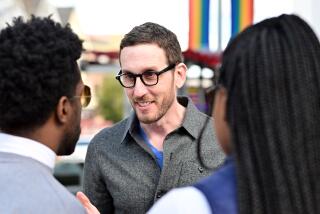Amendment on Computer Privacy Urged : Law: Professor tells conference that the Constitution should be changed to protect individual rights threatened by technology.
- Share via
BURLINGAME, Calif. — One of the nation’s leading experts on the Bill of Rights proposed Tuesday that the U.S. Constitution be amended in order to preserve privacy and other individual rights threatened by the spread of computer technology.
In a speech punctuated with references from John Locke, Lily Tomlin, Albert Einstein and Darth Vader, Harvard law professor Laurence H. Tribe called for a 27th Amendment at the First Conference on Computers, Freedom & Privacy.
The conferees are attempting to develop policies that will strike a balance between civil liberties and computer security.
The gathering comes after a year of conflict between law enforcement and the burgeoning computer communications community.
Conference Chairman Jim Warren, a software entrepreneur, said a series of raids by the U.S. Secret Service and other agencies last year raised fears about the repression of computer users and prompted him to convene a gathering at which high-tech cops, indicted computer hackers, civil libertarians and corporate security chieftains could interact.
Warren said it appeared that technology had outpaced the law, creating a host of potential problems.
In his keynote speech, Tribe said the Constitution needs to be amended to cope with the many questions raised by the advent of “cyberspace,” a place without physical walls, or even physical dimensions, where an increasing amount of the world’s communication and business--ranging from ordinary letters to huge global transfers of money--is taking place, via computer and telephone lines.
The existence of such a place creates all sorts of potential problems, Tribe noted, because the nation’s constitutional order historically has carved up the social, legal and political universe along the lines of “physical places” which, in many situations, no longer exist.
There is a “clear and present danger” that the Constitution’s core values of freedom, equality and privacy will be “metamorphosed into oblivion” unless policy-makers come to grips with the ramifications of technological change, Tribe said.
The professor has successfully argued many cases before the U.S. Supreme Court and is frequently mentioned as a likely nominee to the high court if the Democratic Party regains the White House and a seat opens up.
Tribe stressed that, in the past, the Supreme Court has been slow to adapt to technological change. He noted that it took more than 40 years from the time the issue was first raised until telephone conversations were given the same protections as physical searches of homes or businesses.
Tribe said that an increasing amount of government resources is being utilized to investigate and prosecute computer hackers, in some instances ill-advisedly. He acknowledged, however, that the threat of computer crime from such “invisible trespassers” is real.
The proposed new amendment would provide that the Constitution’s protections for free speech and against unreasonable searches shall be fully applicable, regardless of the technological method or medium used to transmit, store, alter or control information.
The point, he said, would be to make it clear that the Constitution, as a whole, “protects people, not places,” the same principle that was enunciated in 1967 when the Supreme Court ruled that the 4th Amendment’s prohibition against unreasonable searches and seizures applied to telephone conversations.
Tribe’s speech generated lengthy applause from the audience of about 400.
Janlori Goldman, director of the American Civil Liberties Union’s Project on Privacy & Technology, said Tribe’s remarks were “inspirational in a number of ways. People need to be able to maintain control over information about themselves.”
On the other hand, she said, the idea of an amendment “makes me nervous. I think those rights already are in the Bill of Rights, but the courts are reading it wrong.”
Lance Hoffman, a George Washington University professor of computer science, said he liked Tribe’s point of having “core values,” rather than technology, as the driving force behind the nation’s laws. “I like the ideas, whether or not there has to be an explicit constitutional amendment.”
Hoffman said there is considerable concern about how to design appropriate laws for the so-called Information Age. He addressed the problem of so-called computer hackers:
“We’re casting about, because we’re in a new age in our technological development, an age where a person can spend $1,000 and buy the computer equivalent of a Saturday Night Special and take down a large computer system.”
In response to questions, Tribe said that he did not have a particular timetable for attempting to get his proposed amendment adopted.
The professor said he was normally wary of Constitutional amendments, noting that he had opposed one that would have made it a crime to burn the American flag. But he said the computer revolution has created “substantial gray areas” that need to be addressed.
Tribe said several senators and Congressmen have expressed interest in these issues. He said he hopes his speech Tuesday would be a starting point for further debate on the issues.
“This proposed amendment, fairly uncontroversial in substance, should provoke people to ask, ‘Why do we need it?’ ” Tribe said.
Several years ago, bills were proposed in the California Legislature that would have had the same effect as Tribe’s amendment, said Robert Jacobson, a former state Senate consultant and now the associate director of the Human Interface Technology Laboratory in Seattle.
The measures were defeated, Jacobson said, largely because of opposition from the California District Attorneys Assn.






